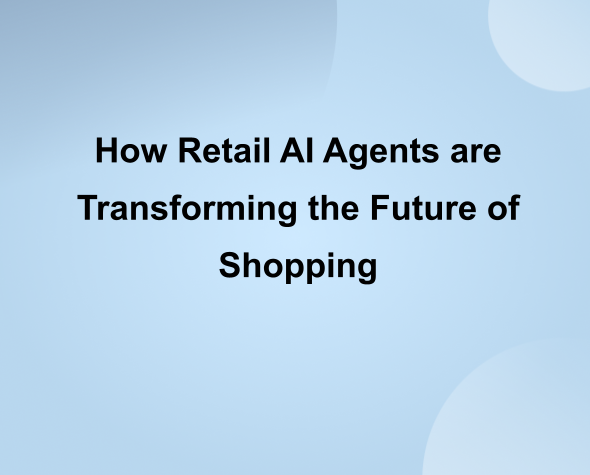The eCommerce world has had its share of supposedly revolutionary trends — from the mobile app boom years ago to newer AR/VR, social commerce, and live shopping technologies.
Despite their usefulness, these technologies didn’t fundamentally change online shopping. Sure, they offered new ways to drive revenue but the experiences (and challenges) of both customers and retailers remained largely unchanged.
However, we’re now in the early stages of reshaping the future of eCommerce and retail in general thanks to Agentic AI. The new retail AI agents — which we’ll explore in this guide — are a massive step forward as they anticipate customer needs and take action autonomously to achieve key business goals.
In fact, some brands are already using AI agents to deliver tailored shopping experiences, manage supply chains, monitor inventory levels, and much more. For example:
In this guide, we’ll explore how retail AI agents work, their key applications, and their most important benefits. We’ll also use Agent One™ — our suite of purpose-built agents — to show different types of agents and the impact they can bring.
What are retail AI agents?
Retail AI agents (sometimes called shopping agents or just agents) simulate a personal assistant that understands preferences, answers questions, recommends items, and predicts what a shopper might want based on behavior and context.
They remove friction from the shopping experience and drive product discovery by helping users find, compare, and purchase products more efficiently.
Additionally, AI agents in general have the potential to reinvent eCommerce and retail across the board. Beyond creating exceptional shopping experiences, these systems can help optimize marketing campaigns, streamline supply chain management, and much more.
Here are three examples of AI agents from Agent One™ that are purpose-built for different business goals:
1. The Shopping Agent helps customers find what they need with personalized, intent-based recommendations. It uses behavioral cues and contextual data to understand what customers need, guiding them through a smooth shopping experience without having to be prompted at every step.

2. The Support Agent uses real-time data to answer questions and solve customer problems on the spot. Its answers are emotionally intelligent, offering reassurance and solutions based on the context. It can also be reactive or proactive, depending on the best way to solve the problem.

3. Our Insights Agent gives marketers a real-time pulse on performance, with actionable insights and recommendations. It can automatically surface problems and offer solutions, saving time, energy, and resources for marketing teams.

How are AI agents different from chatbots?
If you’re just diving into the world of Agentic AI, you might be wondering what makes these agents different from chatbots. After all, both types of technologies can answer customer questions, show products, and solve various issues.
In short, the main difference lies in the ability to understand intent, make smart decisions, and drive valuable business outcomes autonomously.
In that sense, AI agents operate like highly skilled consultants who understand customers’ needs and the business backend (e.g., inventory, discounts, upcoming arrivals) and confidently act on that understanding. Chatbots, on the other hand, often aren’t useful beyond answering standard questions or solving simple problems.
Here’s why:
Most chatbots are built on decision trees or flowcharts. This enables them to guide users through a predefined path to solve straightforward issues like:
- Explaining your return policy.
- Checking the status of an order.
- Answering questions about product availability based on current inventory.
Because they rely on fixed scripts, chatbots can usually direct users down a limited decision tree in a reliable and predictable way.
However, if a customer asks something outside that narrow scope, the system struggles. This can lead to vague answers, longer wait times, or a handoff to a real person.
AI agents, on the other hand, don’t just follow scripts.
Instead, they use machine learning, language understanding, and real-time data to interpret what a customer actually means — not just what they typed. And unlike chatbots, AI agents can then:
- Make smart decisions autonomously, without being prompted by the customer.
- Adjust their approach on the fly, such as when the customer gets frustrated or starts losing interest.
- Aim to achieve specific business outcomes like increasing AOV with relevant cross-sells and upsells. This can involve asking relevant follow-up questions and getting a better understanding of customers’ needs based on their answers and historical data.
Put simply, AI agents offer a much more fluid and intelligent experience — a big step forward from the limited chatbots most people are used to.
Benefits of implementing retail AI agents
The new types of AI agents can be extremely versatile for retailers looking to solve all sorts of problems. Specifically, they bring three essential benefits for both customers and companies:
- Enhanced customer experiences. By understanding individual preferences and behaviors, AI agents can offer relevant product recommendations, answer queries promptly, and create a seamless shopping experience across all touchpoints.
- Automatic data-driven insights. AI agents analyze customer data to provide actionable insights, informing business decisions. This includes identifying trends, preferences, and potential issues, so retailers make smarter decisions.
- Operational efficiency. Automation of routine tasks allows employees to focus on more strategic activities. AI agents can handle many tasks such as answering FAQs and managing inventory, freeing up people to concentrate on areas that require human creativity and judgment.
These benefits directly affect businesses’ bottom lines by driving more revenue (thanks to better shopping experiences) and creating more streamlined, cost-effective operations.
Key applications of autonomous AI agents in retail
Retailers can leverage Agentic AI in tons of ways.
In fact, we’re still only scratching the surface of these technologies yet there are use cases that clearly benefit customers’ shopping experiences and brands’ bottom lines.
Below, we’ll explore four of these applications of retail AI agents.
1. Autonomous decision-making at scale
AI agents are capable of taking initiative without necessarily being prompted or getting instructions.
For example, say you have a customer who’s traveling to London and needs a new jacket for the trip. A traditional chatbot could offer jackets based on the customer’s instructions when it comes to color, price, and other attributes (assuming it’s programmed to do so).
However, an AI-powered agent can go much further. Insider’s Shopping Agent can check weather forecasts as well as the customer’s previous purchases and interactions to determine the best possible option for them.
Then, it can include other variables into the equation such as which products are discounted, best-sellers, or frequently bought with the customers’ previous purchases.

In other words, the agent can understand and anticipate intent, which is a massive improvement over reactive chatbots. When implemented correctly, this can drive massive engagement and revenue improvements as thousands of customers can get a tailored experience that was previously unattainable in the world of eCommerce.
2. Deep data integrations for real-time personalization
Another huge benefit of AI agents is how they use customer data. With deep integrations across personalization tools, eCommerce systems, CDPs, CRMs, and much more, retail agents can get a holistic view of each customer.
As a result, product suggestions align more closely with what shoppers actually want, search experiences feel intuitive and dynamic, and upsell opportunities surface organically rather than being pushed.
This level of personalization, grounded in real-time insight is only made possible by overcoming data silos with deep integrations. For example, Agent One™ integrates with tons of different solutions as well as with our proprietary:
- eCommerce CDP that creates 360-degree profiles for each customer filled with valuable data like channel interactions, purchases, preferences, and more.

Personalized site search and merchandising platform, which boosts product discovery with AI-powered product recommendations.

- Smart Recommendation models, which deliver tailored product recommendations and maximize cross-sell and upsell opportunities.

This makes our Shopping Agent (and the Insider platform as a whole) a complete solution for personalized product discovery.
The agent can leverage the right data to deliver the right content, messaging, and product recommendations to each customer, at the right time — a massive upgrade from the traditional experience of searching for products using keywords and simple chatbots.
3. Emotionally resonant conversations
One of the main limitations of chatbots is that conversations with them often feel off — the tone can be wrong or the replies don’t address the issue expressed by the customer. These tone-deaf responses can make users feel ignored or misunderstood, leading to high bounce rates and lost revenue.
AI agents aim to change that by factoring in sentiment and emotional cues when responding. They don’t just parse language — they pick up on how someone’s feeling. If a user is clearly frustrated, a well-designed agent will respond with understanding and work to solve the issue directly.

This kind of emotional intelligence adds a layer of authenticity to digital interactions. It creates the sense that someone is truly listening, which can make all the difference in how customers perceive your brand.
4. Automatic learning and improvement
One of the most powerful aspects of AI agents is that they’re constantly evolving. Each customer interaction becomes a learning opportunity informing the agent about what worked, what didn’t, and how to do better next time.
This allows the experience to become more refined and accurate without constant human oversight.
Insider’s Shopping Agent, for instance, becomes more effective the more it’s used. With access to a customer’s browsing history, purchase patterns, and preferences, it can continuously tailor recommendations with greater precision. This kind of learning isn’t just theoretical — it translates into real results.
Bonus: Additional AI use cases for retailers
As you can see, AI-powered technologies can be massively beneficial to customers. However, their utility goes far beyond that as marketing, sales, and merchandising teams can use them for:
- Inventory and supply chain management. AI agents can predict demand, optimize stock levels, and streamline supply chain operations, ensuring that retailers meet customer needs without overstocking or understocking.
- Fraud detection and prevention. AI agents can monitor transactions, identify suspicious activities, and implement preventive measures to protect both retailers and customers.
- Marketing campaign analysis and optimization AI agents can analyze customer behavior, segment audiences, and optimize marketing campaigns to drive sales and improve ROI.
For even more examples and applications, check out our complete guide to the 10 breakthrough trends of AI in retail.
Embrace the future of retail with Insider’s Agent One
Autonomous AI agents are not just a passing trend — they are the future of retail. By embracing these technologies, retailers can enhance customer experiences, streamline operations, and drive growth.
That’s why we’ve built the industry’s most aggressive AI roadmap to help brands stay ahead. Specifically, Agent One™ provides a comprehensive suite of AI agents that empower retailers to:
- Turn their web search engine into an intelligent answer engine that delivers personalized conversations.
- Anticipate customers’ needs, understand the intent behind their queries, and provide relevant product recommendations.
- Integrate with relevant data sources, including 360-customer profiles from our enterprise CDP.
- Manage front-line support by answering customer questions accurately 24/7, powered by CDP, CRM, and other relevant data sources.
- Uncover campaign risks, make recommendations and optimizations autonomously, and anticipate trends to improve performance.
Additionally, Insider offers a plethora of other AI-powered functionalities. Some of these include our Smart Recommender — which delivers tailored product recommendations — and Next-Best Channel and Send-Time Optimization — which optimize campaign performance automatically based on customers’ behavioral patterns.
To learn more about Insider’s AI capabilities and how they can benefit your business, schedule a free demo with our team.



![How AI Chat is Rewriting B2B Software Buying [Insights From 1,000+ Decision Makers]](https://mgrowtech.com/wp-content/uploads/2025/10/dark-17-350x250.png)














